5 Ways Organic Mulch Helps Your Vegetable Garden
This post may contain affiliate links, which means that I may receive a commission if you make a purchase using these links. As an Amazon Associate I earn from qualifying purchases.
Learn how garden mulch can improve your soil, retain moisture, and reduce weeds in your vegetable garden. Discover the best types of organic mulch, how to apply it properly, and common mistakes to avoid for a healthier, more productive garden.
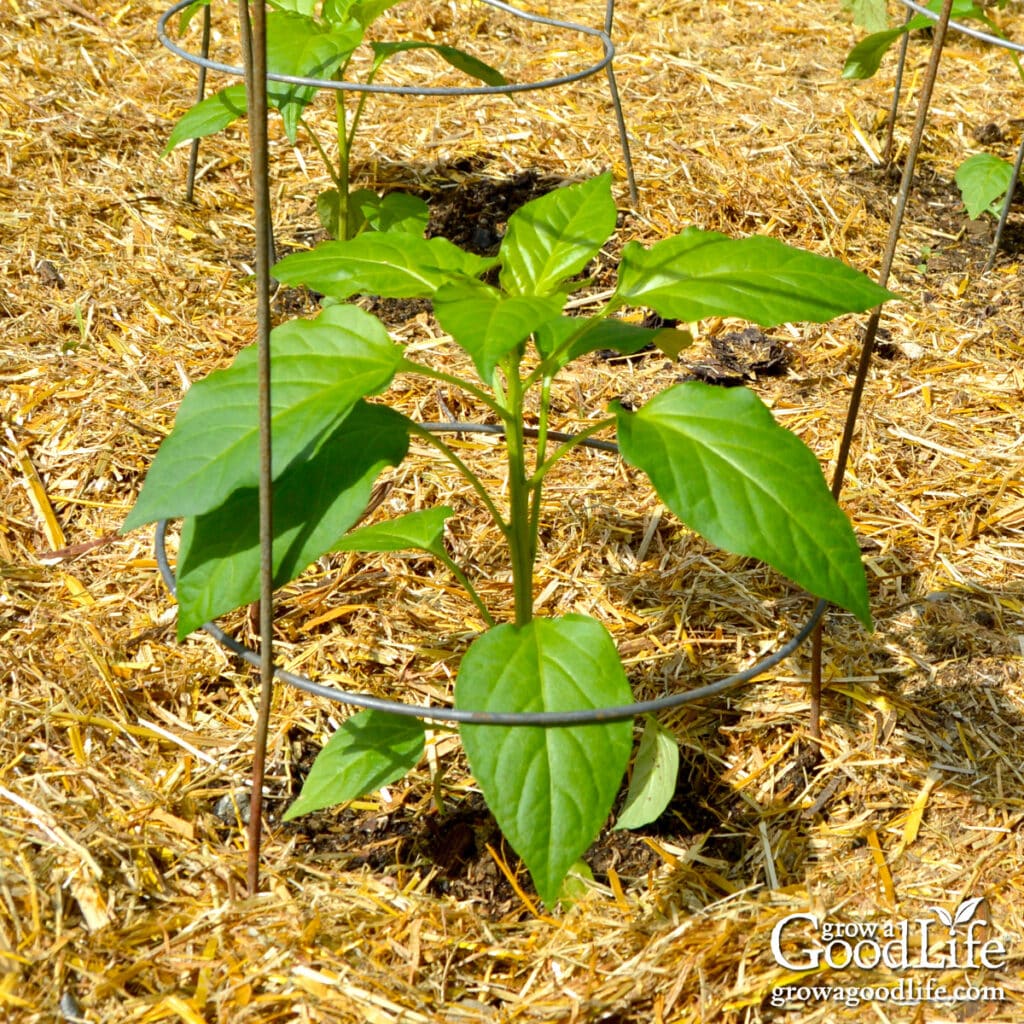
Mulching is one of the simplest and most effective ways to improve your vegetable garden. A good layer of garden mulch helps retain moisture, suppress weeds, regulate soil temperature, and enrich the soil as it breaks down. But not all mulch is created equal, and using it incorrectly can do more harm than good.
In this guide, we’ll explore the best types of mulch, how to apply it properly, and common mistakes to avoid—so you can enjoy a healthier, more productive garden all season long.
What is Garden Mulch?
Mulch is a protective layer of material spread over the soil surface to help retain moisture, suppress weeds, regulate soil temperature, prevent erosion, and improve soil health. It’s an effective way to create a healthier, more productive garden while reducing the need for frequent watering and weeding.
Mulch can be organic or inorganic. Organic mulches, such as straw, wood chips, and shredded leaves, gradually break down, enriching the soil with nutrients. Inorganic mulches, like plastic or landscape fabric, do not decompose but serve primarily as weed barriers.
My Early Struggles with Weeds
I was thrilled to have an established vegetable garden when I first moved into my home. After years of apartment living, I couldn’t wait to grow my own food. That first spring, I eagerly cleared the weeds and planted my garden, imagining lush, productive beds.
But it didn’t take long for the weed growth to return—stronger than ever. I hoed them down, and they came back. I dug them up again, and they returned with a vengeance. It felt like a never-ending battle, and by the end of the season, I had all but surrendered, letting the weeds take over.
Two Changes That Improved My Weedy Garden:
Even though I lost my battle with the weeds that first year, I did enjoy some harvests and was confident that I could get more yields for my efforts if the plants didn’t have to compete with weeds. Determined not to repeat my first-year struggle, I spent the winter researching better gardening techniques. The following spring, I made two key changes:
- Added New Raised Beds: The following spring, I built three 4×4 Square Foot Gardens and filled them with new soil. The new raised beds provided a fresh start with nutritious and weed free soil that allowed my plants to grow and flourish without competition from weeds.
- Mulched the Existing Garden Beds: In my in-ground garden beds, I started weeding as soon as the soil was workable, then added compost and a thick layer of straw mulch to keep new weeds from sprouting.
These two changes made an immediate difference, and each year since, my garden has become more manageable and productive.
5 Ways Organic Garden Mulch Helps Your Vegetables
Mulching isn’t just about weed control—it benefits your entire garden ecosystem. Here’s how:
- Adds Nutrients and Organic Matter: As organic mulch decomposes, it enriches the soil with nutrients, improves soil structure, and encourages beneficial microbes and earthworms.
- Suppresses Weeds: A generous layer of mulch will shade the soil and deprive weed seeds of the sunlight needed to germinate and grow. Covering the soil also prevents seeds dropped by birds or wind from coming in contact with the soil surface and taking hold.
- Conserves Soil Moisture: Mulching helps retain soil moisture by shielding the soil surface from the moisture sapping effects of heat, sun, and wind. Reducing evaporation offers more consistent moisture levels for the plants, improving overall health.
- Prevents Soil Erosion: Mulching the surface of the soil protects it from the eroding effects of wind and rain. By covering the soil, mulch protects it from the impact of heavy rain and wind, helping to prevent valuable topsoil from washing or blowing away.
- Regulates Soil Temperature: Covering the soil with mulch shade and insulates the soil from the hot sun and summer heat. This helps keep the soil cool and prevents soil-temperature fluctuations that can stress your plants.
Types of Organic Mulch
Over the years, I’ve experimented with different garden mulches, including straw, wood chips, shredded leaves, and even plastic solar mulch and landscaping fabric.
Although the solar mulch and landscape fabric did a great job preventing weeds, I didn’t like how quickly they wore out after only a few years and had to be thrown away. Now, I prefer using organic materials that enrich the soil as they break down. Here are my favorites:
Straw:
My top choice for mulching vegetable beds is straw. I purchase a big, rectangle bail in the spring from my local farm and feed store, and it is enough to mulch the whole garden plus extra to line the nesting boxes in the coop. Straw decomposes slowly, retains moisture well, and doesn’t compact easily.
Why Use It?
- Straw is lightweight, easy to spread, and slow to break down.
- It does a great job of suppressing weeds while still allowing water and air to pass through.
- It provides a clean, dry surface around plants, reducing soil splashing that can spread disease.
How to Use It:
- Spread a 4 to 6-inch layer around plants, leaving a small gap around stems to prevent suffocation.
- Replenish as needed throughout the season.
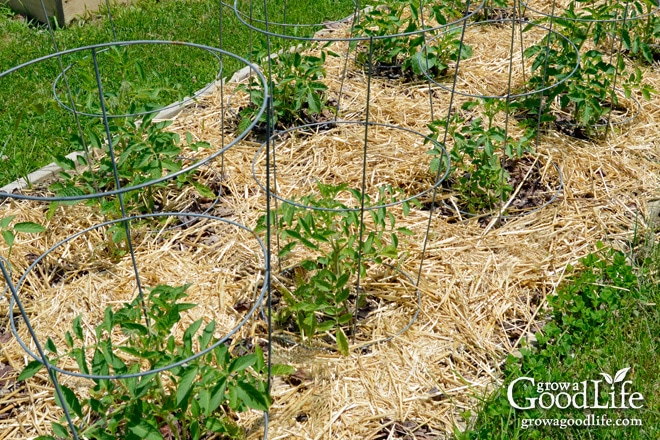
Shredded Leaves
Dried leaves are a free and effective mulch. I’ve found that whole leaves tend to blow away, but shredding them helps them stay in place. But leaves can mat down over time and form a barrier that prevents water and air from reaching the soil. So, I occasionally fluff them up to prevent compaction.
Why Use It?
- Readily available in the fall, making it a free mulch option.
- Provides excellent coverage for the soil and breaks down into leaf mold, a nutrient-rich humus.
- Attracts beneficial soil organisms like earthworms.
How to Use It:
- Shred leaves before applying to prevent them from matting and blocking water penetration. I like using my lawnmower and a bagger to collect the shredded leaves.
- Apply a 3 to 4-inch layer around plants.
- Turn the mulch occasionally to keep it from compacting.
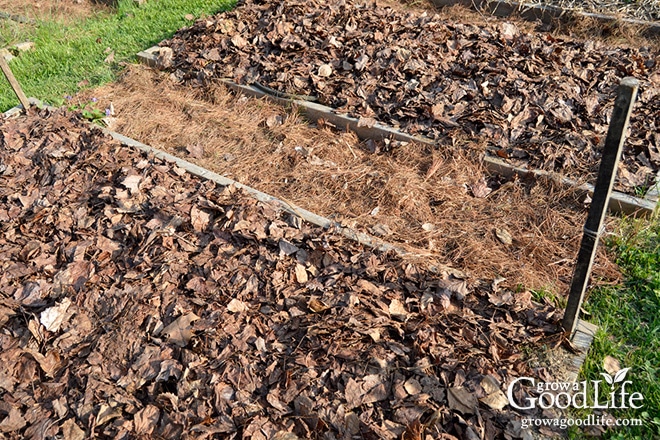
Pine Straw (Pine Needles)
Pine straw is pine needles that have fallen from the tree. Since we have a lot of pine trees surrounding our property, pine straw is a cost-free option. Some gardeners worry about acidity, but pine straw has a neutral effect on soil pH once it decomposes.
I use it mainly for pathways between raised beds. Layered thickly, pine straw does a good job of suppressing weeds. It does break down quickly when walked on and needs to be replenished a few times a year.
Why Use It?
- A long-lasting mulch that doesn’t compact, allowing air and moisture to reach the soil.
- Pine needles decompose slowly in the garden beds, requiring less frequent replenishment.
How to Use It:
- Apply a 2 to 3-inch layer around plants.
- Add a generous layer over cardboard along garden pathways.
- Replenish as needed.
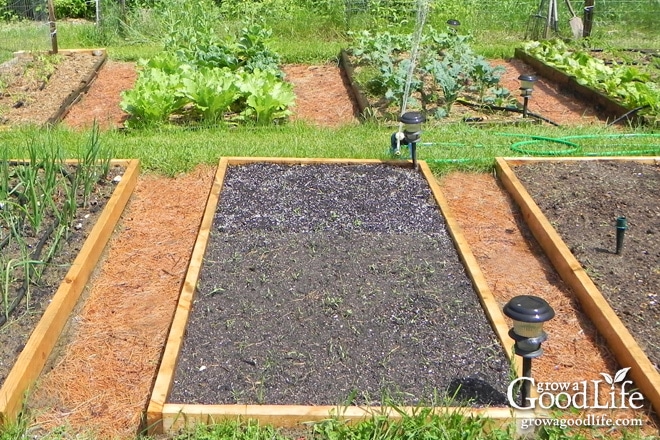
Grass Clippings
Grass clippings are a free and nitrogen-rich mulch that helps retain moisture and suppress weeds. They break down quickly, feeding the soil and improving its structure. However, thick layers can mat down, preventing air and water from reaching plant roots.
To avoid introducing weeds into your garden, use only grass that hasn’t gone to seed and avoid clippings mixed with mature weeds. Always use untreated lawn clippings to prevent introducing herbicides or pesticides into your soil.
Why Use It?
- A free and readily available mulch that provides nitrogen as it decomposes.
- Helps retain moisture and suppress weeds.
How to Use It:
- Apply in thin layers (1/2 inch at a time) to prevent it from matting and creating a barrier.
- Allow clippings to dry before adding another layer.
- Break up to prevent compaction and replenish as needed.
Arborist Wood Chips
Wood chips are a valuable mulch option in an organic garden, especially when sourced from local arborists. Unlike bark mulch or colored mulch, which may contain dyes or chemicals, fresh arborist wood chips are a mix of tender wood and foliage that helps improve soil health over time.
Ramial wood chips, in particular, are an excellent choice. These chips come from young trees, branches, brush, and leaves. This composition makes them rich in nutrients, as younger plant material breaks down more readily than larger, older hardwood. The leaves provide nitrogen, which helps decompose the carbon-rich branches, creating a slow-release source of organic matter that enhances soil structure and microbial life.
Why Use It?
- Provides long-term weed suppression and soil protection.
- Helps retain moisture and prevents erosion.
- Slowly releases nutrients and organic matter into the soil.
How to Use It:
- Apply a 2 to 4-inch layer around plants, leaving several inches bare around the stems.
- Use a generous layer in between garden paths.
Compost
Compost serves as both mulch and a natural fertilizer, improving soil health while helping it retain moisture. Rich in nutrients, compost supports plant growth and attracts beneficial organisms like earthworms. A thin layer of compost around plants can suppress weeds while feeding the soil, making it a great choice for vegetable gardens, raised beds, and container plants.
Why Use It?
- Acts as both mulch and a soil amendment, enriching the soil as it breaks down.
- Helps retain moisture while feeding plants with nutrients.
How to Use It:
- Apply a 1 to 2-inch layer as a top dressing around plants.
- Can be mixed with other mulches for added benefits.
- Learn how to make your own compost: How to Make Compost
Living Mulch
Cover crops can also be used as a living mulch. Unlike traditional mulches, which are applied as a layer on top of the soil, living mulch consists of low-growing plants that spread to cover the ground. Some common choices for living mulch include radishes, clover, and oat grass.
These plants help suppress weeds, retain moisture, and prevent soil erosion while also adding organic matter as they grow and decompose. Living mulch requires careful management to prevent competition with crops. Regular trimming or strategic planting ensures it remains beneficial rather than invasive. The trimmings can be left in the garden as mulch, or added to the compost pile.
Why Use It?
- Forms a dense ground cover that outcompetes weeds.
- Adds organic matter and fosters beneficial soil microbes.
- Protects the soil from wind and water erosion.
- Attracts pollinators and beneficial insects.
How to Use It:
- Interplant with vegetables around and in between rows to suppress weeds.
- Terminate or cut back as needed to prevent competition with crops.
- Select low-growing cover crop options suited to your climate, soil type, and crop rotation needs.
- Learn more about growing cover crops: Tips for Planting Cover Crops in Home Gardens.
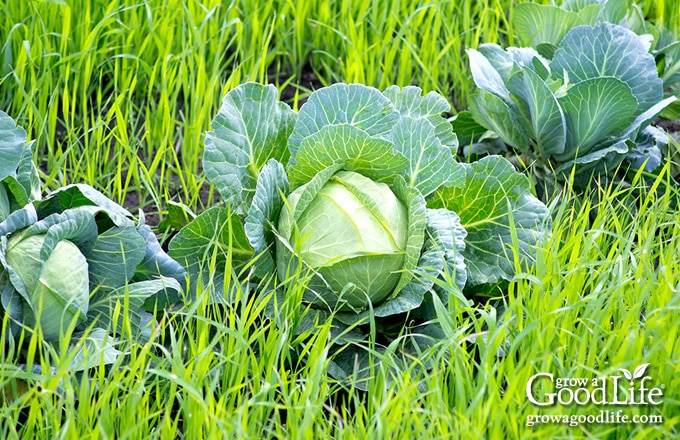
How to Use Mulch in Your Vegetable Garden
Using mulch properly can enhance soil health, reduce weeds, and conserve moisture throughout the growing season. Follow these steps to get the most out of mulching in your vegetable garden:
- Prepare the Garden Bed: Start with a weed-free bed by removing any existing weeds and adding a layer of finished compost or manure to enrich the soil. Water thoroughly before planting.
- Plant Your Vegetables: Arrange your plants as desired, ensuring proper spacing for healthy growth.
- Apply Mulch: Spread a 4 to 6-inch layer of organic mulch evenly around plants, keeping it a few inches away from stems to prevent rot and pest issues. If using a drip irrigation or soaker hose system, lay the drip line or hoses first, then cover them with mulch to retain moisture efficiently.
- Maintain and Replenish: Occasionally check for weeds that manage to break through and remove them before they spread. Add fresh mulch as needed throughout the season to maintain coverage and continue protecting the soil.
By following these steps, your mulch will effectively support your vegetable garden, helping you grow healthier plants with less effort.
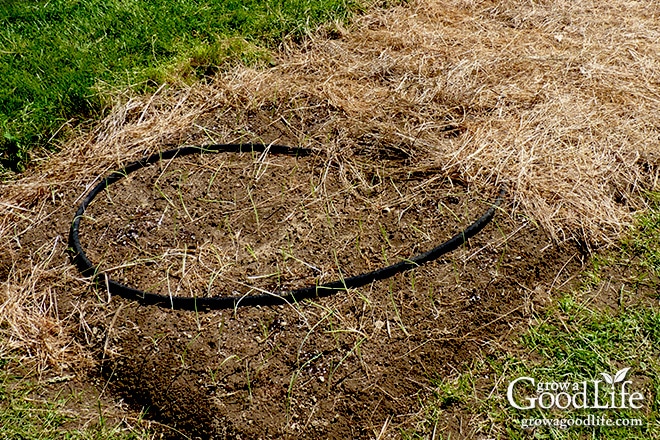
Mulching for Winter Protection
It’s important to let your garden soil freeze over the winter. Freezing temperatures naturally eliminate many fungal diseases and pests. Applying too much mulch can insulate the soil, preventing it from freezing and creating a cozy environment for pests to overwinter. Instead, follow these guidelines for effective winter mulching:
- Winter Garden Prep: After the growing season, rake aside old mulch, remove plant debris, and spread a fresh layer of compost. Then, lightly cover the beds with the old mulch. A thin layer helps protect the soil from erosion while still allowing it to freeze—an essential step in reducing pests and diseases. For more tips on winter garden prep, check out this article: 7 Tips to Prepare Your Vegetable Garden for Winter.
- After the Ground Freezes: If you are overwintering crops, wait until after the ground has frozen before adding a thick layer of mulch. Once the ground is frozen and plants are dormant, mulch garlic, perennial herbs, and overwintered crops with a generous layer. This helps regulate temperature fluctuations and prevents the ground from freezing and thawing repeatedly, which could cause roots to be pushed out of the soil.
- Let the Soil Warm Up in Spring: As temperatures rise in spring and the soil begins to thaw, rake back the mulch to allow the soil to warm up. Once the ground is drained and workable, pull any weeds that have sprouted, then sow seeds or transplant seedlings. Once plants are established, reapply mulch to conserve moisture and suppress weeds for the growing season.
Common Mulching Mistakes to Avoid
Mulching is one of the best things you can do for your garden, but it’s important to apply it correctly to get the most benefits. Avoid these common mistakes to ensure your mulch is helping—not harming—your plants:
- Applying Mulch Too Thickly: While a good layer of mulch helps retain moisture and suppress weeds, too much can create problems. A mulch layer thicker than 3 to 4 inches can compact over time, making it difficult for water to reach the soil. In extreme cases, it can even suffocate plant roots and create conditions for mold or fungal growth. Aim for a balanced layer to get the benefits without the drawbacks.
- Piling Mulch Against Plant Stems or Tree Trunks: It may be tempting to mound mulch around the base of plants or trees, but this can lead to rot and invite pests. Volcano mulching results in excess moisture around the stems or tree trunks, creating a damp environment where diseases can thrive. Instead, leave a small gap around plant bases, keeping the mulch a few inches away to allow airflow and prevent decay.
- Using Mulch Contaminated with Weed Seeds or Pesticides: Not all mulch is created equal. Some materials, like fresh hay or clippings, may contain weed seeds that will sprout in your garden, creating more work for you later. Additionally, some hay or straw may have been treated with herbicides that can linger in the soil and affect plant growth. To avoid these issues, source mulch carefully—use aged straw, untreated grass clippings, or wood chips from a trusted source.
By keeping these common mistakes in mind, you can make the most of your mulch and create a healthier, more productive garden!
The Long-Term Benefits of Mulching
Using mulch transformed my weedy, labor-intensive garden into a more productive and manageable space. While it hasn’t eliminated weeds completely, it has significantly reduced them, making the ones that do sprout much easier to remove. Plus, as organic mulch breaks down, it continually improves my soil, enhancing its texture and fertility year after year.
If you find yourself constantly battling weeds, give mulching a try. It can save you hours of work while benefiting your plants and soil in the long run.
Note: This article was originally published in July 2015 and updated in 2025 with expanded details, new mulching materials, insights on common mulching mistakes, and more practical tips to help you mulch your vegetable garden effectively.
Building healthy soil is the foundation of a productive vegetable garden. Using natural methods like cover crops, compost, and organic mulch materials can enrich the soil, boost fertility, and support a thriving garden ecosystem—without relying on synthetic fertilizers or pesticides. Combining these techniques allows you to create nutrient-rich soil that nourishes your plants season after season. For more tips on improving your garden soil, explore these helpful resources:
Good planning is key to a successful vegetable garden
Whether you are new to growing your own food or have been growing a vegetable garden for years, you will benefit from some planning each year. You will find everything you need to organize and plan your vegetable garden in my PDF eBook, Grow a Good Life Guide to Planning Your Vegetable Garden.


I’m planning on making raised beds for my garden this spring, so this post will be very helpful! I’m excited to try these tips out.
Sage, I’m thrilled to hear that you found the tips helpful! Best of luck with your raised beds project this spring.
My straw mulch started growing all linds of mushrooms and fungi as it decomposed. It also seemed to stay wet longer. Should I turn it under? Add another layer? Ignore the fungi?
Leah, This is just what you want to see. The fungi and mushrooms are all part of the decomposition process that will feed that help create healthy soil. You can add another layer of straw on top to keep the moisture in, but there is no need to turn it under. The worms and other microorganisms in your soil will break down the organic matter and convert it into nutrient-rich humus over time.
I live in upstate SC and am using once ground mulch (trees,limbs, etc) and it works fine, plus it doesn’t wash away when it downpours. Get a lot of good gardening info from Davidthegood.com.
Rex, We had some trees taken down last year and asked to keep the ground up wood chips. I am experimenting with it as a mulch in the garden this year and really like how well it holds in moisture.
I love straw, but now so many farmers are using such horrible chemicals I don’t know where to find safe straw any longer.
Tina, Sadly, this is something to worry about in straw and animal manure.
Very interested in this. I will try it going forward this fall!
Thanks
I use wood chips on the paths around my raised beds. In the beds themselves, i use a chopped straw product called Mainely Mulch (comes from Maine of course). It is heat treated to kill any weed seeds and the fact it is chopped makes it easy to spread on the beds and around plants. It lasts the season then decomposes well over the winter.
Dave, Wood chips in the paths is a good idea. I bet it lasts longer than pine straw. I tried the heat treated, Mainely Mulch this year too with mixed results. I don’t think I was generous enough with it. I found weeds popped up through it quite easily. I think maybe a thicker layer would work better.
Gosh this mulch sounds like a dream come true! I will have to try to find it or something similar locally here in Northern Nevada!! Thanks, Carolyn
Now that I volunteer at a farm, I am really aware of the difference between weeding open land and in raised beds. I knew there would be a difference, but wow – it’s pretty dramatic. Straw is my favourite mulch for the beds as well & I use wood chips for the paths. The paths, especially, are a lot of work in the beginning but once that initial layer of mulch (and in my case cardboard to smother the grass) is down, maintenance is so much easier.
I didn’t know about heavily mulching AFTER the ground freezes so thank you for that tip!